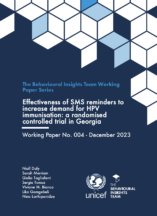Abstract
Interventions informed by behavioural science can help to overcome barriers to childhood vaccination, and increase vaccine uptake, at a low cost to public health authorities. In Georgia, a country with low rates of uptake of the HPV vaccine, we conducted a country-wide RCT that included over 55,000 girls aged 10-12, representing the entire population of eligible unvaccinated girls of this age in the country. Our findings highlight the effectiveness of low-cost interventions, and add compelling evidence to support the use of ‘reminder’ messages for health services. Working with national public health authorities, we randomised this eligible population of unvaccinated girls into one of five trial arms. Caregivers of the girls in four of the arms were sent different versions of a behaviourally informed SMS reminder, reminding them that their daughter was due to receive the first dose of the HPV vaccine. The control group was sent no SMS reminder. The reminders were sent in September 2022, beginning a 62-day trial period. Our analysis shows that 2,032 girls received the vaccine during the trial, a vaccination rate of 3.76%. This varied from a rate of 2.4% for the control group, to 4.7% for the group that were sent the ‘reserved’ framing version of the SMS reminder, which was associated with the highest rate of vaccine uptake. Our analysis shows that each version of the SMS reminder was more effective than the control at increasing uptake of the HPV vaccine, with ‘reserved’ framing the most effective.
JEL codes: D91, I12, C93
Keywords: vaccination; nudge; field experiment; randomised control trial; human papillomavirus






